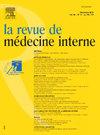Safety profile of JAK inhibitors in inflammatory or autoimmune diseases
IF 0.9
4区 医学
Q3 MEDICINE, GENERAL & INTERNAL
引用次数: 0
Abstract
Over the past decade, Janus kinase inhibitors (JAKi) have emerged as a promising treatment for inflammatory and autoimmune diseases. Concurrently, there has been increasing attention to their potential side effects, particularly infectious and cardiovascular risks. In this review, we outline the various adverse effects of these treatments and emphasize the importance of their prevention. First, we examine the risk of infection and the preventive measures through screening, vaccination, and prophylaxis. Subsequently, we explore the risk of developing malignant tumors, venous thromboembolism, and major cardiovascular events. Although the data are sometimes inconsistent, they indicate the existence of a subpopulation at increased risk of JAKi side effects, including patients over 65 years of age, those with cardiovascular and malignancy risk factors, and smokers. Finally, we discuss the risk and prevention strategies for gastrointestinal perforation, as well as the risk of biological abnormalities, such as cytopenias, cytolysis, dyslipidemia, and elevated CPK levels.
JAK抑制剂在炎症或自身免疫性疾病中的安全性
在过去的十年中,Janus激酶抑制剂(JAKi)已成为一种有希望治疗炎症和自身免疫性疾病的药物。同时,人们越来越关注它们的潜在副作用,特别是感染和心血管风险。在这篇综述中,我们概述了这些治疗的各种不良反应,并强调了预防它们的重要性。首先,我们检查感染的风险和预防措施,通过筛查,疫苗接种和预防。随后,我们探讨了发生恶性肿瘤、静脉血栓栓塞和主要心血管事件的风险。虽然数据有时不一致,但它们表明存在一个亚人群,包括65岁以上的患者、有心血管和恶性肿瘤危险因素的患者以及吸烟者,JAKi副作用的风险增加。最后,我们讨论了胃肠道穿孔的风险和预防策略,以及生物异常的风险,如细胞减少、细胞溶解、血脂异常和CPK水平升高。
本文章由计算机程序翻译,如有差异,请以英文原文为准。
求助全文
约1分钟内获得全文
求助全文
来源期刊

Revue De Medecine Interne
医学-医学:内科
CiteScore
0.70
自引率
11.10%
发文量
526
审稿时长
37 days
期刊介绍:
Official journal of the SNFMI, La revue de medecine interne is indexed in the most prestigious databases. It is the most efficient French language journal available for internal medicine specialists who want to expand their knowledge and skills beyond their own discipline. It is also the main French language international medium for French research works. The journal publishes each month editorials, original articles, review articles, short communications, etc. These articles address the fundamental and innumerable facets of internal medicine, spanning all medical specialties. Manuscripts may be submitted in French or in English.
La revue de medecine interne also includes additional issues publishing the proceedings of the two annual French meetings of internal medicine (June and December), as well as thematic issues.
 求助内容:
求助内容: 应助结果提醒方式:
应助结果提醒方式:


